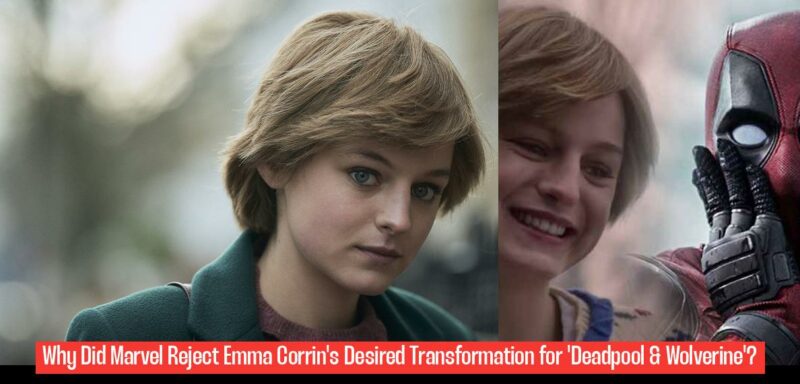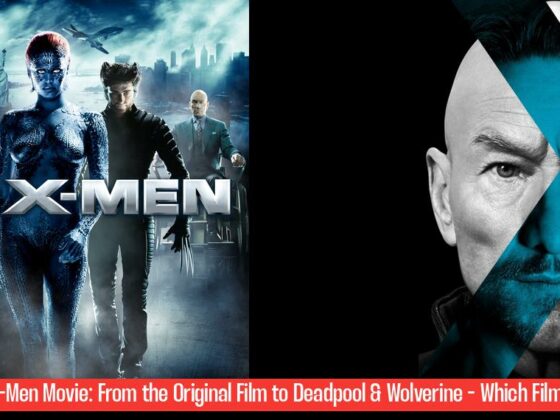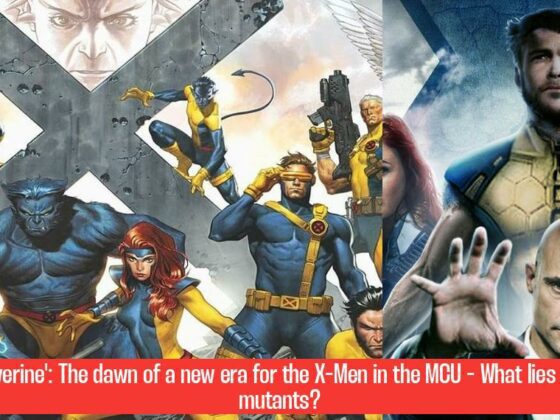Marvel Declined Emma Corrin’s Transformation for ‘Deadpool & Wolverine’
The buzz around Emma Corrin’s role in the upcoming “Deadpool & Wolverine” sequel is reaching fever pitch. The star, known for their captivating portrayal of Princess Diana in “The Crown,” is set to take on a wickedly compelling role as Cassandra Nova, a supervillain from the X-Men universe. But what makes Corrin’s involvement even more intriguing is the revelation that they were denied the opportunity to fully embrace the character’s physical transformation.
Corrin recently shared that Marvel declined their request to undergo extensive physical training for the role. In their words, “They said I didn’t have to do any physical training. I was totally willing to undergo a major transformation, but they said ‘that’s not at all necessary, so calm down.’ At least I tried.” So, what was so compelling about this transformation that Marvel decided to pass on? And what does it reveal about the direction of this highly anticipated sequel?
The answer lies in Cassandra Nova’s unique history. She’s not just any villain; she’s Charles Xavier’s estranged sister, adding a complex layer to the narrative. This family connection, intertwined with Cassandra’s powerful psychic abilities, fuels her desire for revenge against the X-Men, making her a formidable adversary.
Corrin’s desire to physically embody this complex character speaks volumes about their dedication to their craft. They saw a chance to not only portray Cassandra’s wickedness but also to visually encapsulate her inner turmoil, her years of resentment and isolation. They wanted to visually represent the struggle that lies at the heart of this character, the battle between humanity and the destructive force of revenge.
Marvel’s decision to decline Corrin’s request raises intriguing questions about their vision for the character. Did they believe that a physical transformation was unnecessary, that Cassandra’s menace could be conveyed solely through Corrin’s acting? Or was there a more strategic reason behind their decision? Perhaps they wanted to keep Cassandra’s appearance more ambiguous, leaving room for interpretation and adding an element of mystery to the character.
Exploring the Nuances of Transformation
The debate surrounding transformations in superhero movies is a complex one. For some characters, a radical physical change is essential to embody their essence, to visually convey their power and their otherworldly nature. Think of Chris Hemsworth’s transformation for the role of Thor, with his sculpted physique and flowing blonde hair, embodying the God of Thunder’s divine power.
But for other characters, a physical transformation can be a distraction, potentially hindering the actor’s ability to convey the character’s emotional depth. Take Hugh Jackman’s Wolverine, a character defined by his ruggedness and raw power. While Jackman certainly underwent rigorous training to achieve Wolverine’s physique, his focus was on portraying the character’s inner turmoil, his struggle to control his primal instincts.
Corrin’s desire to transform for the role of Cassandra Nova reflects their deep understanding of the character’s complexities. They saw a physical transformation as a way to fully embody Cassandra’s internal conflict, her monstrous nature, and her desperate yearning for revenge. It’s a testament to their commitment to bringing this character to life in a truly unique and memorable way.
The Significance of Marvel’s Decision
The decision to decline Corrin’s transformation request opens up a fascinating discussion about Marvel’s creative vision for “Deadpool & Wolverine.” Is Marvel leaning towards a more grounded portrayal of Cassandra Nova, focusing on her emotional depth and psychological complexities rather than her physical presence?
Or is this a deliberate attempt to subvert expectations, to portray a supervillain who is not defined by their physique but by their cunning intellect and manipulative nature? Perhaps Marvel is aiming for a more nuanced portrayal of the character, one that challenges viewers’ preconceived notions of what a supervillain should look like.
Whatever the reason behind Marvel’s decision, it’s clear that Emma Corrin’s commitment to this role is unwavering. Their desire for a complete transformation speaks volumes about their dedication to portraying a truly compelling and complex character. Whether or not we see a physical transformation on screen, Corrin’s nuanced portrayal of Cassandra Nova is sure to be a highlight of “Deadpool & Wolverine.”
Emma Corrin’s Inspiration for Cassandra Nova
The anticipation for Emma Corrin’s portrayal of Cassandra Nova in “Deadpool & Wolverine” is reaching a fever pitch. Fans are eager to see how Corrin will bring this complex, powerful, and somewhat terrifying supervillain to life. But what is Corrin’s own inspiration for this role? What sources are fueling their interpretation of this iconic X-Men character?
Corrin has revealed that their inspiration for Cassandra Nova comes from a surprising source: the realm of music. In a recent interview, Corrin shared that they drew inspiration from the music of the late, great David Bowie. Specifically, they cited Bowie’s iconic album “Low” as a key influence on their portrayal of Cassandra Nova, finding a resonance between the album’s themes of alienation, isolation, and the struggle for identity and Bowie’s own transformation throughout his career.
“Low” is considered one of Bowie’s most experimental and introspective albums, marked by its stark, minimalist soundscapes and haunting lyrics. It reflects a period of significant personal growth and transformation for Bowie, marked by his break from conventional rock and roll and his exploration of new musical styles and concepts. The album’s themes of isolation, alienation, and the search for identity resonate deeply with Cassandra Nova’s own story, a character driven by a thirst for revenge and a desire to reshape the world according to her own twisted vision.
Corrin’s choice of “Low” as an inspiration for Cassandra Nova is a testament to their creative approach to the character. They not only see the character’s external manifestation, her psychic powers, and her role as a villain, but also recognize the emotional complexities that drive her actions. By drawing inspiration from Bowie’s artistic evolution and the themes of “Low,” Corrin is able to tap into Cassandra Nova’s inner turmoil and create a more nuanced and compelling portrayal.
The Power of Musical Inspiration: Bowie’s Legacy
Bowie’s influence on artists across genres and generations is undeniable. His ability to reinvent himself, to push boundaries, and to explore the depths of human emotion through music has inspired countless artists. His music is a tapestry of creative expression, a reflection of his own journey of self-discovery and his ever-evolving identity.
Corrin’s admiration for Bowie and their choice to draw inspiration from “Low” for their portrayal of Cassandra Nova is a testament to the enduring power of music as a source of inspiration and creativity. Music, like film, has the ability to transport us to other worlds, to evoke emotions, and to inspire us to see the world in new ways. For Corrin, Bowie’s music provides a window into Cassandra Nova’s psyche, allowing them to understand the character’s motivations and bring them to life in a uniquely compelling way.
The use of music as inspiration for character development is a common practice in the film industry. Composers often use music to set the tone and atmosphere of a film, and directors often use music to guide the actors’ performances. But Corrin’s use of music as a direct source of inspiration for their character’s portrayal is a testament to their unique artistic approach and their deep understanding of the power of music to create and inspire.
The Intersection of Music and Superheroes
The relationship between music and superheroes might seem like an unlikely pairing. Superheroes are often associated with action, spectacle, and larger-than-life characters. Music, on the other hand, is often seen as a more introspective and emotional art form. But the two genres share a surprising amount of common ground.
Music can be used to enhance the emotional impact of superhero films, to elevate the action sequences, and to create a sense of awe and wonder. Just as music can help us understand the characters’ inner world, it can also enhance our understanding of the fantastical worlds that superheroes inhabit.
Corrin’s decision to draw inspiration from Bowie’s “Low” for their portrayal of Cassandra Nova is a reminder that the lines between genres are blurring. Music can inspire artistic expression in unexpected ways, and superheroes can be more than just action heroes. They are complex individuals with their own stories, motivations, and inner conflicts. Corrin’s approach to the character of Cassandra Nova, drawing inspiration from Bowie’s music, is a testament to the ever-evolving nature of superhero storytelling and the endless possibilities of creative expression.
Why did Marvel decline Emma Corrin’s request for physical training in ‘Deadpool & Wolverine’?
Marvel declined Emma Corrin’s request for physical training as they believed it was unnecessary for the role of Cassandra Nova, the supervillain from the X-Men universe.
What does Emma Corrin’s desire for physical transformation reveal about their dedication to the role?
Emma Corrin’s desire to physically embody Cassandra Nova showcases their dedication to portraying the character’s wickedness, inner turmoil, and complex history as Charles Xavier’s estranged sister.
What questions does Marvel’s decision to decline Emma Corrin’s request raise about their vision for the character?
Marvel’s decision raises questions about whether they believed Cassandra’s menace could be conveyed solely through acting or if they aimed to keep the character’s appearance ambiguous for added mystery.
Why is the debate surrounding transformations in superhero movies considered complex?
The debate is complex as some characters require radical physical changes to embody their essence, while for others, like Cassandra Nova, the transformation may not be deemed necessary for character portrayal.



